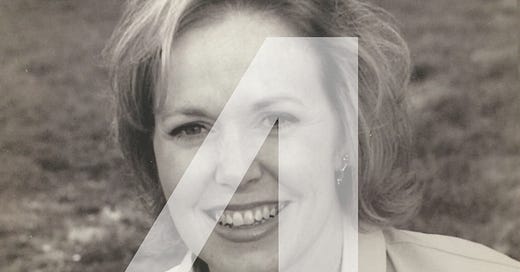This is the last post in a four-post series. Be sure to read Parts one, two, and three before getting into this one.
Writing about these experiences forced me to be as serious as I’ve ever been about recounting my memories and feelings from that pivotal day. I’d be lying if I told you it wasn’t painful to force myself into the shoes of that scared 16-year-old in order to recount just how deeply the experience impacted me. I haven’t snot-cried alone at my laptop like that in quite a while.
Being serious or sensitive about tragedy is the opposite of my go-to coping mechanism. If you know my family or me, you are probably aware that we use humor as the primary lens to view tragic events from our past. We have been known to dish out more than a few “dead mom” jokes at the expense of making other people feel really uncomfortable. In fact, I remember being in the very same seminary classroom about a year after my mom had passed, arguing with my best friend about what was worse, having a dead mom or a father who had abandoned you (his own unfortunate plight). This was not a private conversation amongst ourselves. Instead, we would intentionally play the “how uncomfortable can we make our teacher and classmates game” right out in the open, and usually, we would both win.
There are volumes to be written about what transpired in the months and years after Mom passed. Suffice it to say, it was the most turbulent time of my young life. Getting used to constant change became the actual game we were forced to learn how to play. I’ll save the details from those stories for future posts, but some notable events include:
Dad getting re-married just four months after mom died, bringing a new step-mom and five additional step-siblings into the family. (You’re doing the math right, that’s ten kids total).
Me going on my first date with the woman I would ultimately fall madly in love with and marry.
Me leaving to serve a two-year mission for the LDS church in Managua, Nicaragua.
Dad selling the home we grew up in and moving the new family unit down the road from Wanship to Hoytsville.
Life had certainly changed for good. As I sit here calling up these memories some 20 years later, it’s hard to believe that any of it really happened. It's almost as if I'm chronicling someone else's journey from afar rather than recalling the intricacies of my own life.
All things considered, the word that stands out most prominently in my mind as I think about my past is “grateful.” I am well aware that I am not the first to experience tragedy or loss. My experience with hardship and heartbreak pales in comparison to many who have been through so much worse. I’ve learned that there are countless life experiences not associated with death that can still be the source of tremendous discomfort and anguish. The first of the four noble truths of Buddhism essentially sums up the fact that “in life, we suffer.” While I plan to delve into my thoughts on what constitutes ”truth” in future posts, this truth about suffering certainly resonates with me.
Getting used to impermanence as we navigate the utter chaos of human existence seems to be the ultimate life hack. Sometimes, we stand on life’s tallest peaks with the sun in our faces. Other times, we’re crying in the fetal position in her low and scary valleys. It’s not always my knee-jerk reaction, but when I do find myself experiencing something I’d rather not deal with, I try to remember that this is precisely what living life is supposed to be: a continuous amalgamation of highs and lows. The Greek philosopher Epictetus said it well,
“Do not seek for everything to happen as you wish it would rather wish that everything happens as it actually will—then your life will flow well."
Here’s to going with the flow.
-Brayden




